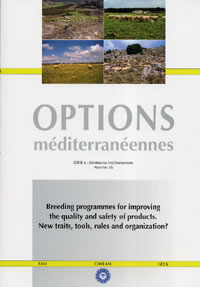| Article précédent | p. 99-106 | Article suivant |
The goat alphas1-casein gene: A paradigm of the use of a major gene to improve milk quality?
Recent developments in molecular techniques have allowed for an easy identification of genotypes for major genes, with an important effect on quantitative traits, early in the life of candidates to selection. Using this genotypic information, together with performance values, may enhance the selection response. However, methods for combining genotypic and performance information should be designed specifically for each population and selection scheme. The case of the polymorphism of the major gene CSN1S1, coding for as1-casein, and its effects on casein content and renneting properties of milk is briefly reviewed, with particular reference to comparisons between French and Spanish breeds. Results of a simulation comparing different strategies for using CSN1S1 genotype information to improve selection response, under the specific conditions of main Spanish breeds, are given. Conclusions are drawn about the adequacy of different modes of using this information under different combinations of initial allele frequencies and average milk protein contents.
- [ Afficher ]
- [ Télécharger ]
- [ Exporter la citation ]
Vous pouvez télécharger la citation au format :
- [ Imprimer ]
-
Mots-clés
CAPRIN, LAIT, POLYMORPHISME, PROTEINE, SELECTIONCiter cet article
Serradilla J.M. The goat alphas1-casein gene: A paradigm of the use of a major gene to improve milk quality?. In : Gabiña D. (ed.), Sanna S. (ed.). Breeding programmes for improving the quality and safety of products. New traits, tools, rules and organization?. Zaragoza : CIHEAM, 2003. p. 99-106. (Options Méditerranéennes : Série A. Séminaires Méditerranéens; n. 55). Meeting of the Sub-Network on Genetic Resources of the FAO-CIHEAM Inter-Regional Cooperative Research and Development Network on Sheep and Goats, 2002/05/9-11, Sassari (Italy). http://om.ciheam.org/om/pdf/a55/03600069.pdf



